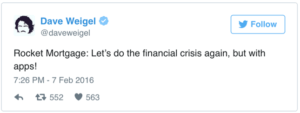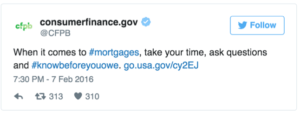Need a mortgage? There’s an app for that too

"What if we did for mortgages what the Internet did for buying music and plane tickets and shoes?” Quicken Loans “rockets” mortgage lending into the digital age
Quicken Loans made a splash at the 2016 Super Bowl with its ad for Rocket Mortgage, a new mobile app that allows customers to be approved for a mortgage in minutes. The ad generated buzz, driving 14,000 visits to Rocket Mortgage’s website the first minute after it aired.[1] But for many, including the regulator and Dave Weigel of the Washington Post, the ad triggered flashbacks to the destructive lending practices that caused the 2008-2009 financial crisis.
![Quicken Loans grew its loan volume from $12 billion in 2008 to $79 billion in 2015[3]](https://d3.harvard.edu/platform-rctom/wp-content/uploads/sites/4/2016/11/Picture5-3-291x300.png)
Quicken originates residential mortgages, incurring the costs of acquiring the customer and underwriting the loan (i.e. determines if they qualify for a loan and at what rate). Unlike a bank, it does not have deposits, but instead uses warehouse loans from banks to fund its loans, before selling them to government-backed Fannie Mae, Freddie Mac, and Ginnie Mae to sell to investors in the form of mortgage-backed securities. Post-sale, Quicken services the loans (i.e. collects interest and principal payments from customers). The company earns two principal streams of revenue: the initial gain on sale and a small servicing fee.
![Quicken is able to charge a premium interest rate vs. most peers[8]](https://d3.harvard.edu/platform-rctom/wp-content/uploads/sites/4/2016/11/Screen-Shot-2016-11-18-at-4.39.38-PM-1008x1024.png)
Once an application is made, Quicken uses computer algorithms to assess loans against its stringent underwriting criteria, then processes the loans through a people-intensive compliance and verification process, made easier by the use of electronic documents. The result is Quicken’s average application-to-approval time of 17.8 days, 8.5 days shorter than the industry average.[9]
Rocket Mortgage takes this convenience further, adding in instant verification capabilities, facilitated by new technology developments. With a few swipes on a smartphone authorizing it to access the borrower’s data, the company can automatically verify credit reports, employment and income for 60% of Americans.[10] Instantly applying the same high quality underwriting criteria it always uses, Quicken is able to tell the borrower if they are approved in minutes, cutting the application-to-approval time dramatically.[11]
![A Screenshot of Rocket Mortgage's mobile interface[10]](https://d3.harvard.edu/platform-rctom/wp-content/uploads/sites/4/2016/11/RocketStepAwaySolution.png)
Rocket Mortgage is still in its infancy and Quicken releases little financial data, so it is too early to judge if the product has been a success. However, with the wave of millennial home buyers just around the corner, Quicken is positioned to continue gaining market share as it targets these customers who are digital natives and value the convenience of online and mobile over face-to-face interaction.[12]
(760 words)
References:
[1] Anthony Mason, “Is the Rocket Mortgage a fast ride to trouble?” CBS News, February 9, 2016. http://www.cbsnews.com/news/is-the-rocket-mortgage-a-fast-ride-to-trouble/
[2] “Fast Facts | Quicken Loans,” Quicken Loans. http://www.quickenloans.com/press-room/fast-facts/
[3] The Economist, “Quicken Loans: A New Foundation,” May 26, 2016. http://www.economist.com/news/finance-and-economics/21699457-one-americas-biggest-mortgage-lenders-not-others-new-foundation
[4] Ibid
[5] Freddie Mac, “Freddie Mac Update,” August 2016. http://www.freddiemac.com/investors/pdffiles/investor-presentation.pdf
[6] Andrea Riquier, “Big banks are fleeing the mortgage market,” Market Watch, February 12, 2016. http://www.marketwatch.com/story/big-banks-are-fleeing-the-mortgage-market-2016-02-12
[7] “Fast Facts | Quicken Loans,” Quicken Loans. http://www.quickenloans.com/press-room/fast-facts/
[8] Hal M. Bundrick, “Do Online Lenders Offer Lower Mortgage Rates? It Depends,” Nerd Wallet, October 28, 2016. https://www.nerdwallet.com/blog/mortgages/online-lenders-consistently-offer-lowest-mortgage-rates/
[9] Scott Beyer, “The Future Of Mortgage Lending Could Be Online,” Forbes, January 15, 2016. http://www.forbes.com/sites/scottbeyer/2016/01/15/the-future-of-mortgage-lending-could-be-online/#5e61e0ec4bea
[10] Hal M. Bundrick, “Quicken Loans and Rocket Mortgage Review 2016,” Nerd Wallet, May 19, 2016. https://www.nerdwallet.com/blog/mortgages/quicken-loans-and-rocket-mortgage-review/
[11] Ibid
[12] FICO, “Millennial Banking Insights and Opportunities,” 2014. http://www.fico.com/millennial-quiz/pdf/fico-millennial-insight-report.pdf





I really enjoyed reading your article about how Rocket Mortgage is disrupting the brick-and-mortar mortgage business. I did want to cover one point at the outset: the tweets you posted as examples of public flashbacks to the financial crisis are relevant, but they miss the true target.
It’s amazing that — eight years after the housing crisis — Fannie Mae, Freddie Mac and Ginnie Mae are still chugging along, gobbling up securitized (i.e., aggregated) mortgages from Quicken Loans and regular brick-and-mortar banks. Quicken Loans is using warehouse loans as short-term financing, to bridge the short timespan it needs between financing the home purchase and selling off the securitized mortgages to the government. In other words, Quicken Loans doesn’t have to worry about the housing market over the mid- or long-term: they just need to worry about the short-term housing market.
As you point out, Quicken Loans generated $80 billion of mortgage volume in 2015. Would Quicken Loans approve a mortgage in 14 minutes if they had to hold those mortgage for 10, 15 or 30 years? Would they create as many mortgages? If the answer is “no,” then we should be taking a close look in the mirror, because this kind of digitization might be a bigger and badder sequel to a horror movie that first aired in 2008.
Don’t get me wrong: I think the digitization of Quicken Loans is a great competitive advantage against its brick-and-mortar competitors. As you point out, they’ve streamlined a very paper-intensive and regulation-heavy process. It just makes me very wary that Quicken Loans is choosing to build their book of business off warehouse loans and little assets…
Ijkijk,
I remember seeing this ad during the Super Bowl and thinking “oh boy, some people are not going to be happy with this.” Like you said, with the financial crisis in such recent memory, it seemed that Quicken Loans was inviting controversy by touting how quick and easy their Rocket Mortgage product was.
However, I, for one, am in favor of the automated mortgage processes. Like you had mentioned, Rocket Mortgage uses the same underwriting standards that Quicken does, merely using technology to quicken the approval process.
One area, in my opinion, that Quicken doesn’t get enough credit for is that by removing the face-to-face element of applying for mortgages, Quicken has reduced both the racial discrimination and the seedy practices that occur during meetings between borrowers and mortgage lending officers.
In terms of racial discrimination, it has been well documented that there is serious bias on the part of mortgage officers when making lending decisions. In a 1996 paper, Munnell found that minorities with similar characteristics as whites were rejected 2.8 times more often [1]. In terms of seedy practices, lending officers during the crisis encouraged borrowers to borrow more than they could in order to win commission. With all communication being electronic, hopefully Quicken will be able to keep a record of all communications and therefore discourage such practices out of fear of consequences.
Overall, despite widespread (and arguably well founded) fears of mortgages being too easy to obtain, I believe that moving the process to a digital format will have highly valuable effects.
[1] Munnell, Alicia H., et al. “Mortgage lending in Boston: Interpreting HMDA data.” The American Economic Review (1996): 25-53.
Really interest article. I remember seeing that Rocket Mortgage ad during the Super Bowl last year and thinking that an app for mortgages was a really dangerous idea and reminded me of the housing market financial crisis. As you mentioned, Rocket Mortgage is so easy to use that it only takes several minutes from application-to-approval. Despite the advances in technology that allow the company to access the borrower’s data and verify credit reports & income in a matter of seconds, I still believe that such an important decision of lending to someone for their home should not be done through an app. This recreates a system without even checks. We need to add more human subjective assessment when giving someone a mortgage rather than making it an automated system on an easy to use app.
As some of the other commentors above expressed, I too am a bit wary of the ease of the Rocket Mortgage approval. While I do believe that there is likely too much subjectivity in the more traditional approval process, I have to wonder why the process took 30 days previously, and can now only be done in minutes – a change that happened seemingly overnight. Sure, 30 days includes a significant amount of exchanging information back and forth between humans that are balancing their daily activities, and take longer to make a decision at each step. And yet, even when Quicken Loans initially removed these lags in the system, they were only able to reduce the total throughput time to approximately 15 days. What allowed them to decrease from 15 days to minutes while maintaining the integrity of their checks?
Their website claims that the difference is simply that Rocket Mortgage uses more definitive information to make approval decisions than the previous process had done. Rocket Mortgage uses bank account balance and live income information to make decisions, and verify one’s income, assets, and credit, almost instantly. Previously, a mortgage provider would ask for W-2’s, pay stubs, or PDF’s, then would interpret these documents, then start the approval process. [1]
However, because these investigations are held private by the company, there is no clear method to understand if there is a difference in integrity of the mortgage approvals, between both systems. My assumption is that HCL’s inclination is correct, that Quicken Loans is only willing to take this risk, because they are immediately turning this around to sell and gain a profit from the US government.
[1] Decker, Rhiannon, August 2, 2016, https://www.quickenloans.com/blog/getting-approved-rocket-mortgage-behind-numbers, Accessed November 2016.